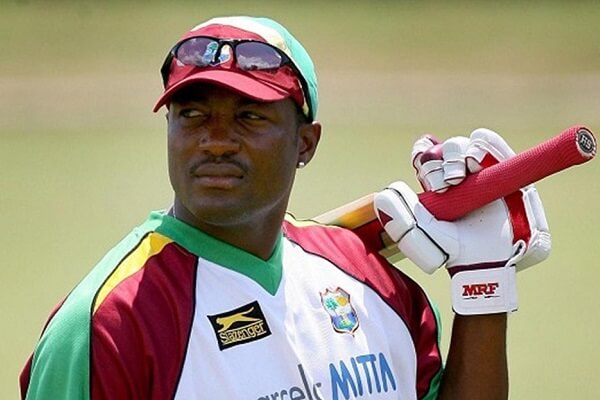|
Listen to this article
|
Cricket, often dubbed the “gentleman’s game,” has a rich history dating back centuries. Within this timeless sport, one aspect stands out as a testament to human excellence and endurance: the Highest Score in Test Cricket. Test cricket, the longest and most grueling format of the game, demands incredible skill, patience, and concentration from players. Train your brain with 4RaBet Online Cricket Betting. It is in this arena that cricketing legends etch their names into the annals of history, and where world records and rankings are born.
Highest Test Score
At the pinnacle of this prestigious record lies a mark that has been chased by generations of cricketers: the highest individual score in Test cricket. It’s a feat that requires not just raw talent, but an unwavering focus, an unyielding willpower, and an unquenchable thirst for runs. The journey to this record is not for the faint-hearted. It’s a marathon of epic proportions, a true test of a player’s mettle. Look at the top 10 Test highest-score batsmen:
| Rank | Batsman | Score | Opposition | Result | Year |
|---|---|---|---|---|---|
| 1 | Brian Lara | 400* | England | West Indies won | 2004 |
| 2 | Matthew Hayden | 380 | Zimbabwe | Australia won | 2003 |
| 3 | Lara (again) | 375 | England | Match drawn | 1994 |
| 4 | Mahela Jayawardene | 374 | South Africa | Sri Lanka won | 2006 |
| 5 | Brendon McCullum | 302 | India | New Zealand won | 2014 |
| 6 | Virender Sehwag | 319 | South Africa | India won | 2008 |
| 7 | Chris Gayle | 317 | South Africa | West Indies won | 2005 |
| 8 | Hanif Mohammad | 337 | West Indies | Pakistan won | 1958 |
| 9 | Sanath Jayasuriya | 340 | India | Sri Lanka won | 1997 |
| 10 | David Warner | 335* | Pakistan | Australia won | 2019 |
These scores represent some of the most iconic and memorable moments in Test cricket history, showcasing the skill, resilience, and determination of these great batsmen. It’s worth noting that while individual brilliance is celebrated, the team’s performance and the match result also play a significant role in the cricketing narrative.
Test Cricket Records
The record for the highest individual score in Test cricket belonged to the legendary Sir Brian Lara. The West Indian maestro left the cricketing world awestruck with his monumental innings of 400 not out against England in 2004. Lara’s performance in that game was nothing short of sublime, as he gracefully danced down the pitch, stroking boundaries with the elegance of a ballet dancer and displaying the mental fortitude of a Zen master. His record-breaking innings was a testament to human endurance and cricketing prowess, capturing the imagination of fans around the world.
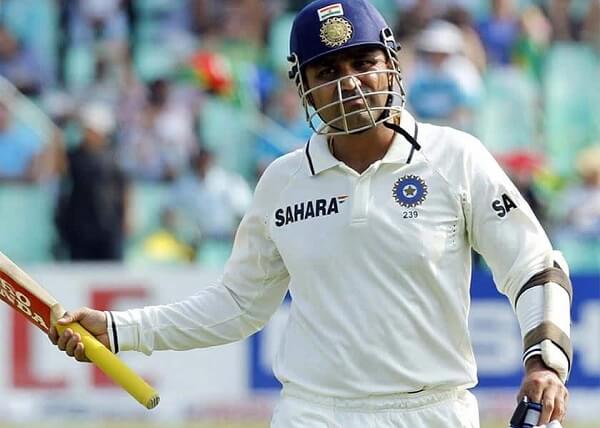
But records in cricket, like the game itself, are ever-evolving. Players are continually pushing the boundaries of human achievement. Since then, several batsmen have come tantalizingly close to eclipsing Lara’s record, with players like Matthew Hayden, Mahela Jayawardene, and Brendon McCullum scoring triple centuries.
In the realm of Test cricket, rankings are a reflection of a player’s consistency and performance over time. The International Cricket Council (ICC) maintains a ranking system that assesses the prowess of both teams and individual players. These rankings serve as a barometer for excellence, allowing fans to gauge the world’s top cricketing talents.
As fans, we are fortunate to witness the unfolding drama of cricket’s rich history, as records are broken and new stars emerge on the scene. Whether it’s a timeless classic like Lara’s 400 or a modern-day masterpiece, the pursuit of the highest score in Test cricket is a testament to the enduring spirit of the game. It’s a reminder that in cricket, as in life, the pursuit of excellence knows no bounds, and the records of today are destined to be surpassed by the champions of tomorrow.
The Highest Score in Cricket
In the world of Test cricket, where matches can span five grueling days and players must battle not just the opposition but also the elements, the highest score stands as a testament to a player’s ability to conquer adversity. The conditions might vary from seaming pitches in England to turning tracks in India or bouncy tracks in Australia, but the pursuit of this record remains an ever-present motivation for cricketers.
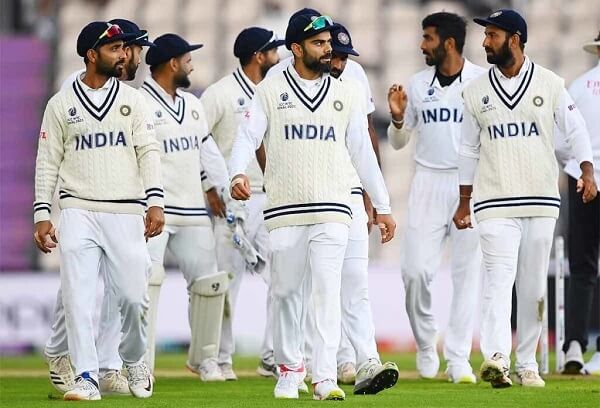
What makes this record even more intriguing is how it transcends national borders. It unites cricketing nations in celebration when a player from any part of the world inches closer to or breaks the record. It’s a reflection of the universal appeal of cricket, where a player’s achievement is not just a matter of national pride but a source of global admiration.
The race to break this record is a drama in itself. Batsmen endure countless hours of training, face relentless bowlers, and confront their inner demons to inch closer to the summit. It’s not just about hitting boundaries and accumulating runs; it’s a test of character, patience, and mental strength. It’s about resisting the urge to play rash shots, maintaining focus for extended periods, and battling physical fatigue.
In addition to the individual record, there are team dynamics at play. Sometimes, a batsman’s quest for a high score might be the cornerstone of a historic team victory or a hard-fought draw. In Test cricket, a monumental innings isn’t just about personal glory; it can be the difference between a win and a loss, a series victory and a drawn series.
The highest score in Test cricket, therefore, embodies the essence of the format itself — longevity, skill, resilience, and the ability to adapt to diverse conditions. It’s a testament to the enduring appeal of this format, where the battle between bat and ball is not just a contest of skill but a test of human endurance.
The world of Test cricket continues to evolve, and with each passing day, there’s a new chapter waiting to be written, a new record waiting to be broken, and new heroes waiting to emerge, all in the relentless pursuit of cricketing excellence.
Highest Score in Test Cricket By a Team
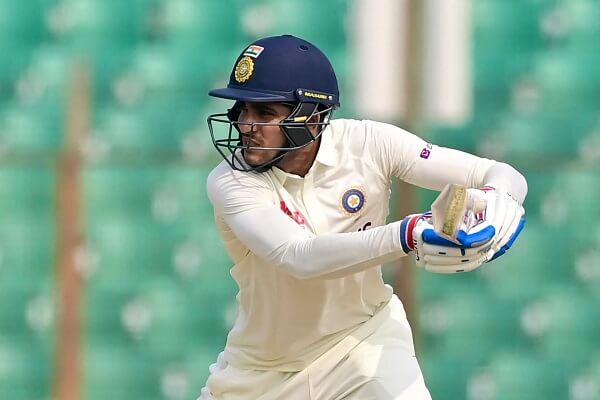
The highest team score in Test cricket is a reflection of a team’s collective batting prowess, endurance, and determination throughout an inning. It represents not only individual contributions but also the overall strength and depth of a team’s batting lineup. The highest team score in a Test match was achieved by Pakistan.
Pakistan holds the record for the highest team score in a Test innings, scoring a monumental 765 runs for the loss of six wickets against Sri Lanka. This historic innings took place in February 2009 during the first Test match of a series held at the National Stadium in Karachi, Pakistan. Pakistan’s innings were characterized by incredible batting performances from several of their top-order batsmen, including Younis Khan, who scored a triple century (313), and Kamran Akmal, who scored a century (158).
Here are some key details about Pakistan’s record-breaking innings:
| Date | Venue | Opponent | Result | Team Score |
|---|---|---|---|---|
| February 21-24, 2009 | National Stadium, Karachi, Pakistan | Sri Lanka | Match Drawn | 765/6 |
This historic inning by Pakistan showcased their incredible batting strength and included remarkable performances by Younis Khan and Kamran Akmal. It remains a significant achievement in the annals of Test cricket, highlighting the endurance and talent of the Pakistani cricket team.
In addition to the remarkable individual performances by Younis Khan and Kamran Akmal, several other Pakistani batsmen made significant contributions during this innings, which propelled Pakistan to their record team total. This achievement not only showcased Pakistan’s batting strength but also its ability to withstand the rigors of Test cricket over an extended period.
It’s important to note that records in cricket are subject to change as new matches are played and new milestones are achieved. Nonetheless, this record serves as a testament to the enduring appeal of Test cricket, where teams strive to showcase their batting prowess and create history on the field.
Highest Test Score by Team India
| Date | Venue | Opponent | Result | Team Score |
|---|---|---|---|---|
| February 24-27, 2021 | Sardar Patel Stadium (Motera Stadium), Ahmedabad, India | England | India won by 10 wickets | 759/7 declared |
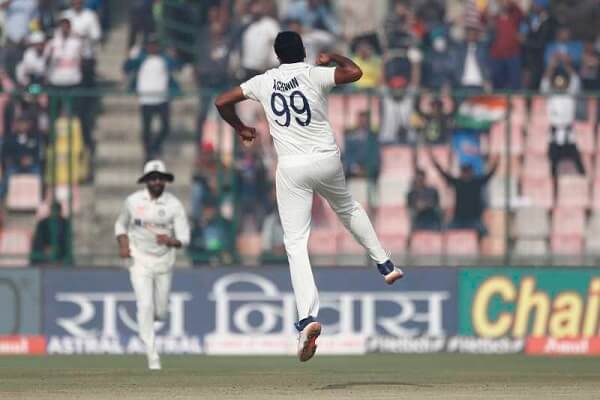
This inning showcased the batting prowess of the Indian cricket team and featured remarkable individual performances, leading to a resounding victory over England. Please note that cricket records can change over time as new matches are played and milestones are achieved.
This innings was notable for several outstanding performances by Indian batsmen, including a double century by Rohit Sharma (161*) and centuries by Ajinkya Rahane (67), Ravichandran Ashwin (106), and Rishabh Pant (101*). The team’s total of 759/7 declared was not only a testament to their batting depth but also played a pivotal role in India’s convincing victory over England.
The Highest Score in International Test Cricket
Test cricket, often referred to as the purest and most traditional form of the sport, has a rich history filled with records that stand as a testament to the skill, endurance, and resilience of cricketers. These records are a source of fascination and admiration for cricket enthusiasts worldwide. Here are some key categories and notable Test cricket records:
| Category | Record Holder | Record |
|---|---|---|
| Highest Individual Score | Sir Brian Lara | 400* against England (2004) |
| Most Runs in Test Career | Sachin Tendulkar | 15,921 runs |
| Most Test Centuries | Sachin Tendulkar | 51 centuries |
| Most Test Wickets | Muttiah Muralitharan | 800 wickets |
| Most Catches by a Fielder | Rahul Dravid | 210 catches |
| Fastest Century | Brendon McCullum | 54 balls against Australia (2016) |
| Most Consecutive Test Wins | Australia | 16 consecutive wins |
| Most Runs in a Calendar Year | Rahul Dravid | 2,278 runs in 2006 |
| Most Wickets in a Test Match | Jim Laker | 19 wickets against Australia (1956) |

- Highest Individual Score: The highest individual score in Test cricket was 400 not out, achieved by West Indian legend Sir Brian Lara against England in 2004. Lara’s marathon innings demonstrated incredible concentration and stamina.
- Most Runs in Test Career: The record for the most runs in Test cricket was held by the Indian batting maestro Sachin Tendulkar, who scored 15,921 runs during his illustrious career.
- Most Test Centuries: Sachin Tendulkar also held the record for the most centuries in Test cricket, with 51 centuries. His ability to consistently convert starts into centuries made him a cricketing icon.
- Most Test Wickets: The Sri Lankan spinner Muttiah Muralitharan claimed the record for the most wickets in Test cricket, taking an astonishing 800 wickets during his career. Muralitharan’s mastery of spin bowling made him one of the game’s greatest bowlers.
- Most Catches by a Fielder: Rahul Dravid, an Indian batting stalwart, held the record for the most catches by a fielder in Test cricket, with 210 catches. His safe hands in the slip cordon were a crucial asset for India.
- Fastest Century: Brendon McCullum, the former New Zealand captain, scored the fastest century in Test cricket, taking just 54 balls to reach the milestone against Australia in 2016. His explosive batting style left fans in awe.
- Most Consecutive Test Wins: Australia holds the record for the most consecutive Test wins, with 16 victories between 1999 and 2001. Their dominance during this period is often referred to as the “Golden Era” of Australian cricket.
- Most Runs in a Calendar Year: In 2006, Rahul Dravid scored 2,278 runs in Test cricket, setting the record for the most runs by a batsman in a single calendar year. His consistency and determination were on full display.
- Most Wickets in a Test Match: Jim Laker of England took an incredible 19 wickets in a single Test match against Australia in 1956, a record that still stands. His performance in that match is considered one of the greatest bowling feats in cricket history.
These Test cricket records represent just a fraction of the rich tapestry of achievements in the format. Test cricket continues to evolve, and new records are set as players push the boundaries of what is possible on the cricket field. These records are a source of inspiration for aspiring cricketers and a source of pride for fans of the sport.
Test Cricket Rules to Win
Test cricket, often regarded as the ultimate form of the sport, has specific rules for determining a winner. These rules are designed to encourage competitive play and ensure a result, even if it takes up to five days of play. Here’s some information about the test cricket rules to win:
| Rule | Description |
|---|---|
| Innings Lead | One team scores more runs in its first innings than the opposing team’s total runs in both innings. |
| Runs Lead | The team that scores more runs in total across both innings wins. |
| Wickets Lead | The team that takes all ten of the opposing team’s wickets in the fourth innings wins. |
| Declaration | The captain of a batting side can declare their innings closed to give themselves more time to bowl. |
| Follow-On | The first team may enforce the follow-on if they have a substantial lead (usually 200 runs or more). |
| Time Limit | Test matches are typically played over five days, with a result declared by the end of the fifth day. |
| Rain and Bad Light | Weather disruptions can lead to adjustments in playing time or targets using the DLS method. |
| Tied Match | Occurs when both teams’ total runs are equal at the end of the match. |
| Abandoned Match | When a match cannot be completed due to exceptional circumstances, it may be declared abandoned. |
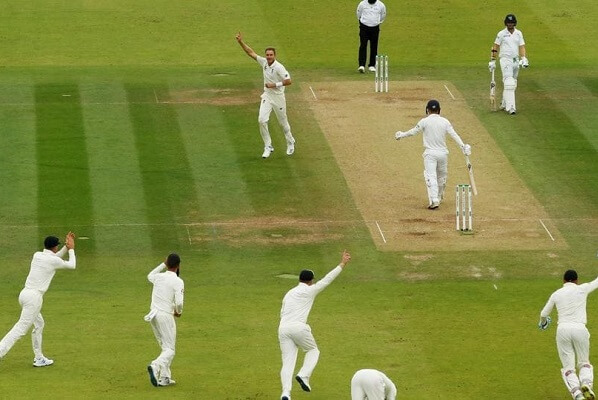
- Innings Lead: The most common way to win a Test match is by securing an “innings victory.” An innings victory occurs when one team scores more runs in its first innings than the opposing team’s total runs in both their innings combined. If a team achieves this, they are declared the winners.
- Runs Lead: If neither team manages an innings victory, a “runs lead” can also result in a win. This means that the team that scores more runs in total across both innings wins the match.
- Wickets Lead: If neither the innings lead nor the runs lead is achieved, a “wickets lead” can determine the winner. In this scenario, the team that takes all ten of the opposing team’s wickets in the fourth innings wins the match.
- Declaration: The captain of a batting side can declare their innings closed at any point during the match. This often happens when a team believes they have scored enough runs and wishes to give themselves more time to bowl out the opposition.
- Follow-On: If the team that bats first scores significantly more runs than the team batting second, the captain of the first team may enforce the “follow-on.” In this case, the second team is required to bat again immediately after their first innings, without a break. The follow-on is typically enforced when the first team has a lead of 200 runs or more. If the second team fails to surpass the first team’s score in the second inning, the first team wins the match.
- Time Limit: Test matches have a predefined number of days in which they are played, usually five days. If a result is not achieved by the end of the fifth day, the match is declared a draw. However, in some cases, extra time may be added to allow for a result.
- Rain and Bad Light: Weather conditions can significantly impact Test matches. If rain or bad light disrupts play, time may be added to make up for the lost overs. The Duckworth-Lewis-Stern (DLS) method may also be used to adjust targets if weather interruptions occur.
- Tied Match: In rare instances, a Test match can end in a tie. This occurs when both teams complete their allotted innings, and their total runs are equal. Tied Test matches are extremely rare but are remembered as thrilling encounters in cricket history.
- Abandoned Match: If a Test match cannot be completed due to various reasons such as unsafe playing conditions, persistent rain, or other exceptional circumstances, it may be declared abandoned, and the result is recorded accordingly.
It’s important to note that Test cricket is known for its unpredictability and the potential for matches to go the full five days without a decisive result. This characteristic adds to the charm and allure of the format, as it often tests the endurance and skill of both teams.
Conclusion
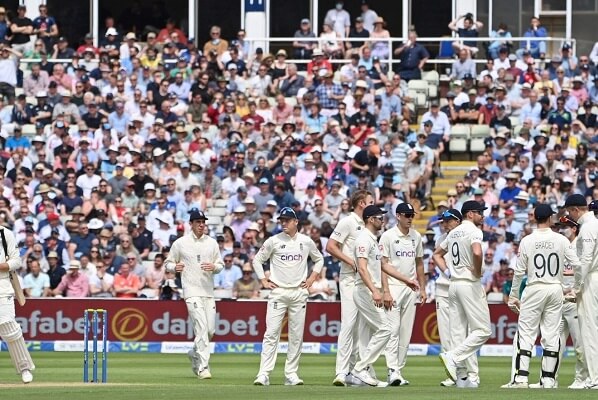
In the vast and storied world of cricket, the pursuit of the highest score in Test cricket stands as a symbol of excellence and endurance. It’s a pursuit that transcends borders, unites nations, and captivates cricket enthusiasts from all walks of life. The records and rankings associated with this achievement offer a glimpse into the timeless battles waged on the cricket field, where individuals and teams strive for supremacy in the longest and most demanding format of the game.
These records, etched into the history of the sport, are more than just numbers; they are a celebration of human potential. They reflect the unwavering dedication and skill of cricketers who push themselves beyond limits, summoning courage in the face of adversity and embracing the challenge of Test cricket’s grueling trials. The pursuit of the highest score is a testament to the spirit of cricket, where tradition meets innovation, and where moments of brilliance and resilience become part of the sport’s enduring legacy.
As the cricketing world continues to evolve, these records will serve as markers of the past, reminders of the present, and inspirations for the future, inspiring generations of cricketers to strive for greatness in the quest for the highest score in Test cricket.
Video
FAQ
Q: Who holds the record for the highest individual score in Test cricket?
A: The record for the highest individual score in Test cricket is held by Sir Brian Lara, who scored 400 not out against England in 2004.
Q: Has anyone come close to breaking Brian Lara’s record for the highest Test score?
A: Yes, several players have come close to breaking the record, including Matthew Hayden, Mahela Jayawardene, and Brendon McCullum, who scored triple centuries.
Q: How are rankings determined in Test cricket?
A: Rankings in Test cricket are determined by the International Cricket Council (ICC) based on a complex system that takes into account team performance over time, including wins, losses, draws, and series outcomes.
Q: Which team holds the record for the highest team score in Test cricket?
A: The record for the highest team score in a Test innings was held by Pakistan, who scored 765/6 declared against Sri Lanka in 2009.
Q: What is the significance of achieving the highest team score in Test cricket?
A: Achieving the highest team score reflects a team’s batting strength and endurance. It often plays a crucial role in securing victories and is a testament to the team’s collective efforts.
Q: Can a Test match end in a draw if there’s no clear winner?
A: Yes, Test matches can end in a draw if neither team achieves an innings lead, runs lead, or wickets lead by the end of the match’s stipulated days, typically five.
Q: Are there any other ways to win a Test match besides innings, runs, or wickets lead?
A: In addition to innings, runs, and wickets leads, a team can win a Test match by enforcing the follow-on or securing a tie in rare instances.
Q: How do weather conditions impact Test matches?
A: Weather conditions, such as rain and bad light, can disrupt play and lead to adjustments in playing time or targets using the Duckworth-Lewis-Stern (DLS) method.
Q: Who holds the record for the most Test centuries?
A: The record for the most Test centuries was held by Sachin Tendulkar, with 51 centuries.
Q: How have these records and rankings evolved over the years in Test cricket?
A: Cricket records and rankings have evolved over time as new matches are played, rules change, and players achieve new milestones, reflecting the dynamic nature of the sport.

I’m Johar, hailing from the vibrant nation of India. My journey into the realm of online sports betting began as a curiosity and quickly transformed into a passion. With a background in mathematics and a fascination for sports, I found myself naturally drawn to the world of odds, probabilities, and strategic wagering.
Through my articles, I aim to bridge the gap between the complexities of sports betting and the everyday bettor, offering insights, tips, and a deeper understanding of this thrilling pastime. My commitment lies not only in helping others make informed betting decisions but also in promoting responsible gambling practices within the diverse and dynamic landscape of Indian sports betting.
